2016步高高考总复习一轮 译林版必修1 Book 1 unit 2 讲义
- 格式:docx
- 大小:1022.28 KB
- 文档页数:23
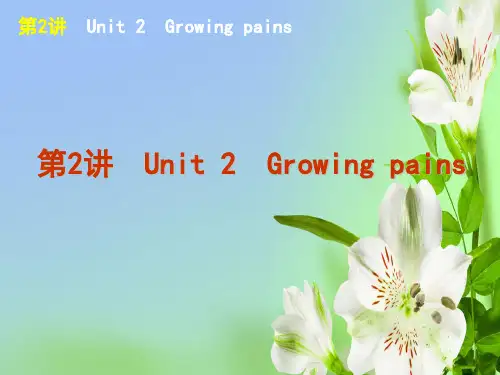
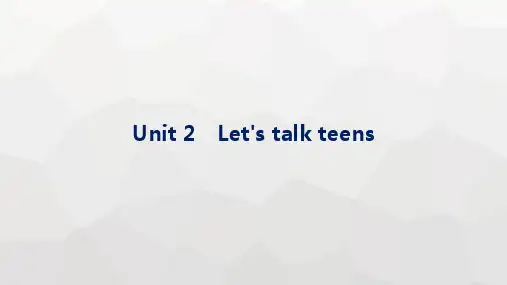
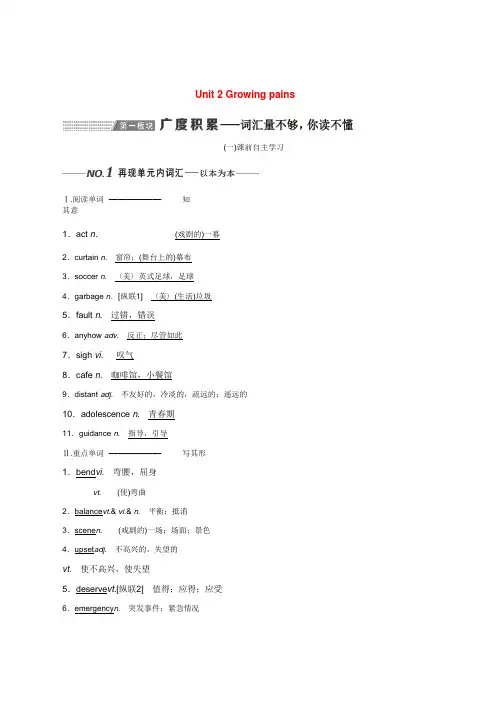
Unit 2 Growing pains(一)课前自主学习Ⅰ.阅读单词——————知其意1.act n.(戏剧的)一幕2.curtain n. 窗帘;(舞台上的)幕布3.soccer n. 〈美〉英式足球,足球4.garbage n.[纵联1] 〈美〉(生活)垃圾5.fault n. 过错,错误6.anyhow adv. 反正;尽管如此7.sigh vi. 叹气8.cafe n. 咖啡馆,小餐馆9.distant adj. 不友好的,冷淡的,疏远的;遥远的10.adolescence n. 青春期11.guidance n. 指导,引导Ⅱ.重点单词——————写其形1.bend vi. 弯腰,屈身vt. (使)弯曲2.balance vt.& vi.& n. 平衡;抵消3.scene n. (戏剧的)一场;场面;景色4.upset adj. 不高兴的,失望的vt. 使不高兴,使失望5.deserve vt.[纵联2] 值得;应得;应受6.emergency n. 突发事件;紧急情况7.last vi. 持久vt. 持续,维持(一段时间)8.handle vt. 处理;应付9.insist vi. 坚持,坚持认为10.teenager n.[纵联3] (13-19岁的)青少年11.patience n. 耐心12.selfish adj.[纵联4] 自私的13.forbid vt. 禁止14.misunderstand vt. 误解15.normal n.& adj. 正常(的),一般(的)16.physical adj. 身体的;物质的17.tend vi. 往往;趋向vt. 照看18.challenge n.& vt. 挑战Ⅲ.拓展单词——————通其变1.frightened adj.受惊的;害怕的→frightening adj.令人恐惧的,令人害怕的→frighten vt.使惊吓,使害怕2.starve vi.挨饿;饿死vt.使挨饿→starvation n.饿死→starving adj.挨饿的3.tolerate vt.容忍;允许→tolerance n.容忍;允许→tolerant adj.宽容的,容忍的4.behavior n.行为,举止→behave v.表现;检点5.defend vt.辩解,辩白;防御,保护→defence/defense n.防御;答辩;防护→defensive adj.防卫的,防御的;辩护的6.argument n.争吵,辩论;论点,论据→argue vt.争吵,争论;论证,争辩7.harm vt.& n.伤害→harmful adj.有害的→harmless adj.无害的8.confused adj.困惑的,不解的→confusing adj.令人困惑的→confuse vt.使困惑,把……弄糊涂;混淆→confusion n.困惑,糊涂;混淆9.limit n.限制;极限;界限vt.限制→limited adj.有限的10. rude adj.粗鲁的,无礼的→rudely adv.粗鲁地,无礼地→rudeness n.粗鲁11.explanation n.解释,说明→explain vt.& vi.讲解,解释纵联1.晒晒“垃圾”朋友圈①垃圾:garbage, rubbish, trash, litter②垃圾桶:trash can, garbage can, garbage bin③垃圾箱:dustbin④倒垃圾:litter, take out the trash, throw the rubbish away纵联2.“词中词”法帮你记①ant→distant遥远的②star→starve挨饿③have→behave表现④arm→harm伤害⑤plain→explain解释⑥serve→deserve值得⑦end→tend趋向纵联3.“青少年”集中营①teenager青少年②youth青少年,青年③adolescent青少年④the young年轻人⑤youngster少年⑥junior年少者;晚辈纵联4.“n.+-ish”集合①selfish自私的②foolish傻的,愚蠢的③childish孩子气的④bookish喜欢书的⑤girlish少女的⑥boyish男孩似的单元话题——成长的烦恼子话题1悲伤与低落①sorrow n. 悲伤,悲痛②blue adj. 悲伤的;沮丧的③down adj. 心情低落的④depressed adj. 压抑的,情绪低落的子话题2忧虑与烦恼①anxiety n. 担忧,焦虑②bored adj. 厌倦的,烦闷的子话题3害怕与恐惧①scare vt. 使害怕,使恐惧②alarmed adj. 担心的,害怕的③terrified adj. 感到害怕的④frighten sb.into doing sth.恐吓某人做某事子话题4遗憾与惭愧①shame n. 遗憾的事;羞愧②disappointment n. 失望;沮丧③ashamed adj. 惭愧的;害臊的子话题5抱怨与冲突①barrier n. 屏障,障碍②friction n. 摩擦③prejudice n. 偏见,成见④tension n. 紧张局势⑤complain vt.& vi. 抱怨⑥embarrass vt. 使尴尬⑦condemn vt. 谴责,指责;宣判[学考对接·活学活用]高考采撷(一)阅读中的词汇应用1.(2018·浙江高考阅读B)Steven Stein likes to follow garbage trucks.His strange habit makes sense◄when you consider that he's an environmental scientist who studies how to reduce litter, including thingsthat fall off garbage trucks as they drive down the road.What is even more interesting is that one ofStein's jobs is defending◄an industry behind the plastic shopping bag ...The bags are prohibited◄insome 90 cities in California, including Los Angeles.①make sense在此处意为:有意义,讲得通,后不跟宾语;make sense of表示“弄懂,理解”,后接宾语。
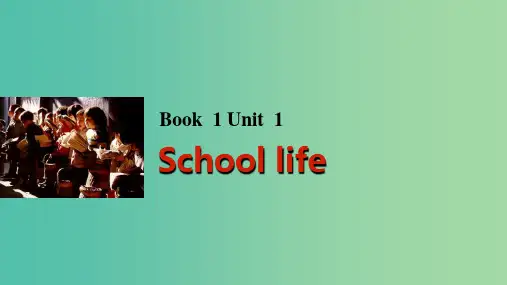
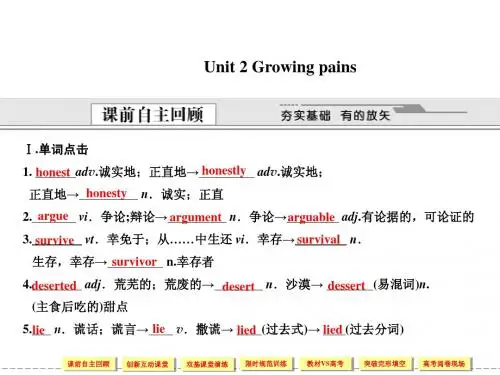
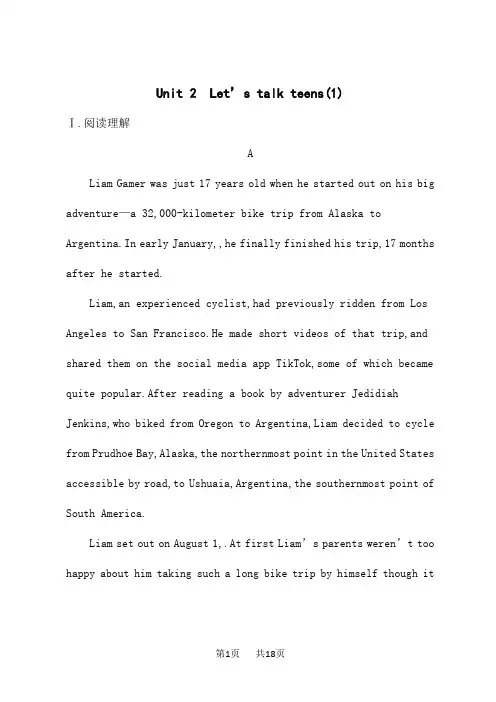
Unit 2 Let’s talk teens(1)Ⅰ.阅读理解ALiam Gamer was just 17 years old when he started out on his big adventure—a 32,000-kilometer bike trip from Alaska to Argentina.In early January,,he finally finished his trip,17 months after he started.Liam,an experienced cyclist,had previously ridden from Los Angeles to San Francisco.He made short videos of that trip,and shared them on the social media app TikTok,some of which became quite popular.After reading a book by adventurer Jedidiah Jenkins,who biked from Oregon to Argentina,Liam decided to cycle from Prudhoe Bay,Alaska,the northernmost point in the United States accessible by road,to Ushuaia,Argentina,the southernmost point of South America.Liam set out on August 1,.At first Liam’s parents weren’t too happy about him taking such a long bike trip by himself though itwouldn’t take that much money.But as he carried on,his parents became his strongest supporters.After about three months,Liam had crossed the US,going south along the West Coast.By early December,he had reached Me which his parents came to the US many years ago.“So crossing the entire country on a bike and reconnecting with my culture and learning the language in the place my family is from are so deeply important to me,” Liam eotionally.But Liam also faced challenges in Meexico,and at one point,he considered quitting because the incredible heat made biking extremely difficult.In all,he was robbed five times on the trip.He got very sick more than once.In Colombia,he had a bike accident that left him injured and required surgery.In spite of it all,he kept going through rain,sun,heat,cold,deserts and mountains.Liam finally arrived in his destination on January 10,—527 days after he started.He had travelled through 14 countries along the way.1.W hat contributed to Liam’s decision to bike through 14 countries?A.His previous related eent.C.A desire to shoot short videos.D.A book by Jedidiah Jenkins.2.Why did Liam feel special in Mexico?A.He went there for the first time.B.He found his family t ree’s roots.C.He biked there as scheduled.D.He had to speak another language.3.What can we say about Liam’s bike trip from Alaska to Argentina?A.It’s eventful.B.It’s pleasant.C.It’s costly.D.It’s romantic.4.What is the author’s purpose in writing the text?A.To inspire our love for nature.B.To promote the low-carbon travel.C.To encourage us to see our strengths.D.To call on us to learn a kind of spirit.BRegenerative tourism is a concept that is gaining attraction in the travel industry.It is different from sustainable tourism in that it goes beyond just minimizing the negative impact of tourism.It is a philosophy that aims to not only minimize the negative impact of tourism but also to actively contribute to the regeneration of local ecosystems,economies,and cultures.The concept of regenerative tourism is not new.Native communities around the world have been practicing regenerative tourism for centuries.However,it has gained renewed interest in recent years due to the growing awareness of the impact of tourism on the environment and the need for sustainable travel practices,particularly post-pandemic-indeed it could even be argued that,as the global tourism industry and those who depend on it start to recover,tourism in itself is a regenerative act.One e is ecotourism.Ecotourism involves traveling to natural areas with the aim of learning about and conserving the environment.It involves activities such as hiking,bird watching,and wildlife viewing.Another e is community-based munity-based tourism involves staying with local communities and participating in their cultural activities,such as our Buffalo Curd Experience in Sri Lanka,or our Rice Wine Trek in Laos.Regenerative tourism can also involve the use of sustainable and regenerative practices in the tourism industry itself.For example,hotels can use renewable energy sources,reduce their water consumption,and use sustainable materials in their construction.The benefits of regenerative tourism are many.However,carrying out regenerative tourism practices requires a shift in mindset and a commitment to sustainability.It requires tourism businesses to not only minimize their negative impact but to actively contribute to the regeneration of the environment and communities.It requires tourists to be conscious of their impact and to choose travel options in line with their values.In conclusion,regenerative tourism is a promising concept that has the potential to transform the travel industry.By actively contributing to the regeneration of local ecosystems,economies,and cultures,regenerative tourism can create a better future for both people and the planet.5.What is the aim of regenerative tourism?A.To attract more investments.B.To highlight the advantages of tourism.C.To protect conventional economy and culture.D.To promote a renewable and sustainable tourism.6.Why has regenerative tourism regained public interest recently?A.Tourism industry has globally boomed.B.People have suffered from the pandemic.C.People show more concern about the environment.D.Regenerative tourism has been practised for long.7.What does paragraph 3 mainly talk about?A.The definition of ecotourism.B.The illustration of regenerative tourism.C.Environmental conservation practices.D.Reasonable doubts about regenerative tourism.8.What might the writer agree with according to the last two paragraphs?A.Regenerative tourism has a bright future.B.Tourists can choose whatever travel they like.C.Travel industry is able to transform regenerative tourism.D.Regenerative tourism can be practised in traditional ways. Ⅱ.七选五We set off on our journey up Mount Wutai onto its peak to appreciate the mysterious and beautiful BodhisattvaLights,ball-shaped lights floating in the whole sky with radiant beams.Seen from the foot of the mountain,the sky was gray and cloudy.1 It sometimes appeared in white mist,and sometimes was completely covered by clouds.On the mountainside,our clothing grew wet. 2 It slowed the horses down to a heavy pace.We spent the night at a small temple.Theneb in the rain.The road was more slippery than the day before,so we had no choice but to get down from our horses and walked on foot.On the way,we were told the unusual phenomenon wouldn’t be observed in the rain.We sighed with disappointment. 3 And the sun set in the west,the clouds disappeared and the mist faded.Eventually,we arrived at the peak,with the sky filled with te in the night,we got awake by a shout.“Get up.Hurry up to see the Lights!” We moved quickly,threw on a few piece s of clothing and ran out.It was cold,making our bodies shake from head to foot. 4 Just before our eyes,the mysterious phenomenon appeared.Thousands of ball-shaped objects floated slowly in the distance,shining golden beams of light,as though the whole sky were filled with countless glowing lanterns.The balls moved across the sky at the same speed. 5 They were light anddelicate.Meanwhile,we all just froze there,speechless with wonder,appreciating the incredible views.A.It seemed to rain soon.B.We had to stop for a shelter.C.Unexpectedly,the sky began to clear.D.In the distance stood the peak,unclear.E.The road was slippery and difficult to walk.F.However,our hearts were filled with excitement.G.They were like goldfish swimming calmly in water.Ⅲ.语法填空A traditional festival closely related to spring,which is 1. (little) known than major traditional festivals,and remained silent for centuries,comes back,thanks to growing2. (enthusiastic) for traditional Chinese culture and a rising demand for seasonal sightseeing tours.The Huazhao Festival is said3.(celebrate) as the birthday of the flower goddess in the second month on the Chinese lunar calendar.Its origin can date back to the period before the Qin Dynasty(221—206 BCE) and was4. (official) set as a festival during the Sui(581—618) and Tang(618—907) Dynasties,ChinaTourismNews reported.During theTang Dynasty,the festival 5.(fall) on the 15th day of the second lunar month.It was one of the three nationwide celebrations back then.The 6. two were the Lantern Festival and the Mid-Autumn Festival.However,the timing of the festival varies betweenregions,because of the difference in7. flowering begins.As a result,many parts of the country take turns to start their celebrations,8.(present) a feast(盛宴) for the eyes in relay.Regardless 9. various highlights,the festive celebrations across different regions share the 10. (feature) of hanfu,a traditional Chinese style of clothing,and flower appreciation.Ⅳ.应用文写作杭州第19届亚运会(The 19th Asian Games)完美收官。
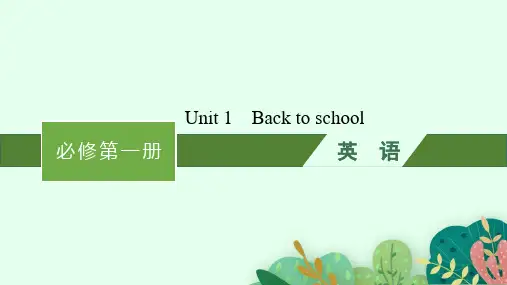
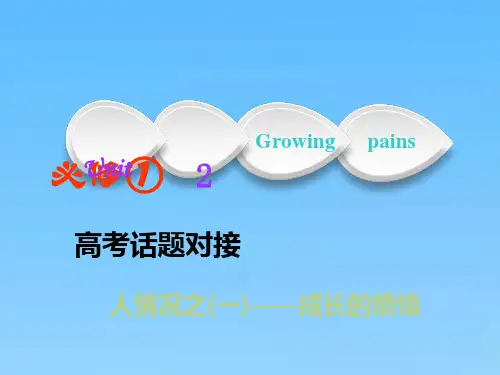
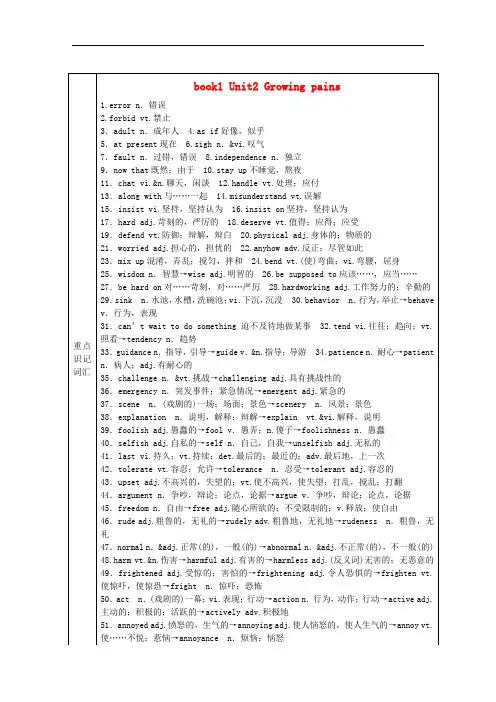
Ⅰ.词汇与派生A.语境填词1.“I can’t tolerate(容忍) your bad manners any longer,” said the man angrily. 2.When she bent(弯腰) down to tie her shoes,other athletes ran past her. 3.What else would you like to say to defend(辩护) yourself?4.Anyone who helped put out the fire deserves(值得) the praise.5.You should apologize to the lady for your rudeness(无礼).6.The most important thing to keep in mind when dealing with a(n) emergency(紧急情况) is to stay calm.7.A good student is someone who always minds his behavior(行为) in school. 8.—What’s wrong with David?—Failing the test made him very upset(不高兴的).9.The manager thinks that Mary should give a(n) explanation(解释) for being late. 10.“Why is everything always my fault(错)?” the boy shouted angrily.11.Now the young man has come back from the prison,but his mother still sighs(叹气) all day.12.An American ship hit an iceberg (冰川) and sank(沉没) to the bottom of the sea. 13.If you think that these transport problems can be solved by building more roads,you completely misunderstand(误解) the nature of the problem.B.用所给词的适当形式填空14.After seeing the frightening film,the frightened boy was frightened to walk home alone in the dark.(frighten)15.I tended my brother carefully,and he had the tendency to recover soon.(tend) 16.Time is limited but there is no limit to serving the people.(limit)17.Miss Smith is always patient with us,as she knows patience is what it takesto be a good teacher.(patient)18.In a society full of challenges and chances,we should do what we can to improve ourselves,which is both challenging and rewarding.(challenge)Ⅱ.短语运用A.用方框内所给动词短语的适当形式填空mix up;insist on;be supposed to;stay up;be hard on;go out;feel like;act like 19.A good boss knows when to be hard on his employees.20.He insists on going swimming with me although he’s very bu sy.21.You were not supposed to play football in the classroom.22.Don’t mix up the bottles,or you’ll have to repeat the experiment.23.I used to stay up late with my mom,watching movies.24.My grandpa sometimes acts like a child,especially when he is playing with my younger brother.25.Jane said that she felt like crying when she heard the sad news.26.They were having a meeting when the lights went out.B.用方框内所给的短语填空can’t wait to;at present;out of control;along with27.We’re so excited that we can’t wait to tell our parents the good news. 28.She lost her job when the factory closed,along with hundreds of others. 29.The children are completely out of control since their father left.30.I’m sorry he’s out at present.Ⅲ.经典句式31.Some people,on losing a job or a special relationship,may feel as if it were the end of the world.有些人一失去工作或失恋,就觉得好像到了世界末日似的。
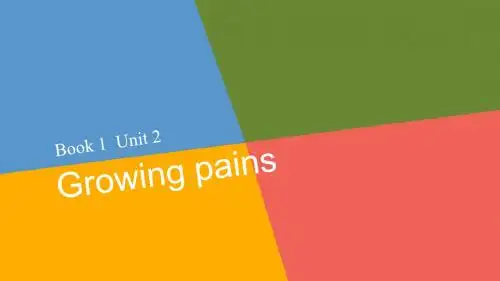
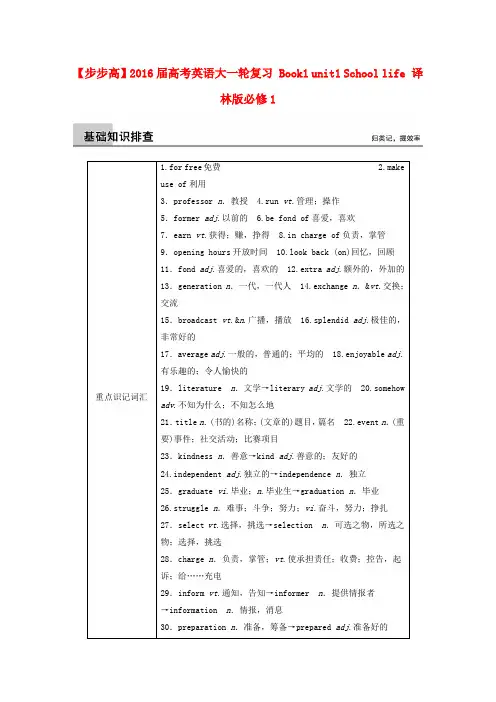
【步步高】2016届高考英语大一轮复习 Book1 unit1 School life 译林版必修1重点识记词汇 1.for free 免费 2.makeuse of 利用3.professor n .教授 4.run vt .管理;操作5.former adj .以前的 6.be fond of 喜爱,喜欢7.earn vt .获得;赚,挣得 8.in charge of 负责,掌管9.opening hours 开放时间 10.look back (on)回忆,回顾11.fond adj .喜爱的,喜欢的 12.extra adj .额外的,外加的13.generation n .一代,一代人 14.exchange n .&vt .交换;交流15.broadcast vt .&n .广播,播放 16.splendid adj .极佳的,非常好的17.average adj .一般的,普通的;平均的 18.enjoyable adj .有乐趣的;令人愉快的19.literature n .文学→literary adj .文学的 20.somehowadv .不知为什么;不知怎么地21.title n .(书的)名称;(文章的)题目,篇名 22.event n .(重要)事件;社交活动;比赛项目23.kindness n .善意→kind adj .善意的;友好的24.independent adj .独立的→independence n .独立25.graduate vi .毕业;n .毕业生→graduation n .毕业26.struggle n .难事;斗争;努力;vi .奋斗,努力;挣扎27.select vt .选择,挑选→selection n .可选之物,所选之物;选择,挑选28.charge n .负责,掌管;vt .使承担责任;收费;控告,起诉;给……充电29.inform vt .通知,告知→informer n .提供情报者→information n .情报,消息30.preparation n .准备,筹备→prepared adj .准备好的→prepare vt.&vi.准备31.donate vt.捐赠,捐献;赠予→donator/donor n.捐赠者→donation n.捐赠物,捐款,捐赠32.fluent adj.流利的,流畅的→fluently adv.流利地,流畅地→fluency n.(语言的) 流利,流畅33.satisfaction n.满意→satisfy vt.使满意→satisfied adj.感到满意的→satisfying adj.令人满意的34.respect n.&vt.尊敬,敬重→respectful adj.表示敬意的,尊敬的→respectable adj.值得尊敬的;体面的35.experience n.&vt.经历,体验→experienced adj.有经验的,经验丰富的→inexperie nced adj.缺乏经验的36.approve vt.&vi.批准,通过;赞成,同意→approval n.批准,通过;赞成,同意→disapprove v.不赞成,不同意37.encouragement n. [U]鼓励,促进;[C]鼓励的话或行为,激励物→encourage vt.鼓励,激励→encouraged adj.受到鼓舞的→encouraging adj.令人鼓舞的必背经典句式1.This means I could get up an hour later than usual,as schools in China begin before 8 a.m.这意味着我可以比平时晚一个小时起床,因为在中国学校上午8点之前就开始上课了。
Unit 2 The universal languageⅠ.阅读理解AYou may have wondered how lavender is used for social anxiety.But first,just what is lavender?Lavender,also known as English or garden lavender,is a herb native to the Mediterranean region.Historically,lavender was used to mummify bodies in Egypt,in baths in Greece and Rome,and for curing the broken skin and mental health purposes.Today,lavender is used as a traditional or complementary remedy for relaxation,to reduce anxiety,and depression,as well as for diseases such as stomach upset and headaches.No scientific studies have specifically examined the benefits of lavender used for social anxiety disorder.In a study,Cook and Ernst reported that in general,aromatherapy(芳香疗法) is helpful in reducing an.A study also showed some evidence of the usefulness of lavender taken for anxiety.More research is needed to support the use of lavender for the treatment of social anxiety disorder.Lavender is usually used in the form of an essential oil as part of aromatherapy.The scent is inhaled,or the oil is applied to the skin,which will benefit the anxious people quickly.Dried lavender can also be used to make a tea or liquid eay also be taken in pill vender tea can be made by using 1 to 2 teaspoons of dried leaves for 15 minutes in a cup of boiling water.In liquid e,no more than 60 drops of lavender should be taken in a day.Before taking lavender in liquid form,you should read the product label and discuss the dose with a qualified health care provider.There is not enough scientific evidence to safely recommend lavender for children younger than 18 vender taken by mouth has the potential to increase the risk of bleeding.If you suffer from a bleeding disorder or are taking medicine that may increase bleeding,use caution when taking lavender.1.What can we know about lavender from paragraph 1?A.It can help deal with mental health problems.B.It was used to preserve dead bodies in Greece.C.It was used to cure stomach upset and headaches.D.It is a herb introduced into the Mediterranean region.2.What is the main idea of paragraph 2?A.The treatment for social anatherapy reducing stress.C.The benefits of lavender used for mental disorder.D.The research on the use of lavender for social anxiety.3.How is paragraph 3 developed?A.By collecting data.B.By making a list.C.By introducing concepts.D.By making comparisons.4.What can we learn about taking lavender from the teay worsen the bleeding.B.It’s proved to be unsafe for kids of 14.vender in pill form functions better than that in liquid.D.A dose should be decided according to the product label.BDeveza’s mother was on the waiting list for a kidney transplant(肾移植).Deveza wanted to donate one of her ownkidneys—but she was turned down because she might develop the same health problems as her mother in later life.Deveza came up with a different plan.In ,she started the world’s first paired exchange of different organs between living donors,eeone else’s kidney.A case study of the organ exchange has now been published,and the surgeons who were involved are calling for more eagine the enormous impact for mixed organ extended chains,” says John Roberts,a surgeon at University of California,San Francisco.Most organ transplants come from people who have died,but there are never enough organs.As most people can manage with just one of their kidneys,people with kidney failure are increasingly receiving donated organs from relatives or friends.If someone wants to donate but their immune system is unsuited,doctors may be able to find pairs of would-be donors who can each give a kidney to the other’s relative.When Deveza was looking into such chains,she came across research describing the idea of trading a kidney with the only otherorgan generally taken from a living donor—the liver.She suggested the idea to many hospitals before she finally contacted Roberts,who saw the idea’s potential.Deveza was assessed to be in good enough health to donate part of her liver.It then took 18 months to find Annie Simmons,in Idaho,whose liver was unsuitable to use as a transplant for her sister with severe liver disease.They drew up a plan:Simmons would donate a kidney to Deveza’s mother,and in return,Deveza would give half her liver to Simmons’ sister.The hospital gave the go-ahead and the four operations took place on the same day successfully.The team hopes that the ground-breaking case will inspire more people to consider doing the same.Roberts says that direct exchanges involving two donors could enable up to thirty extra living-donor liver transplants a year—a ten percent increase.5.What did Deveza do to save her mother?A.Carrying out a case study.B.Calling for kidney donations.unching a medical experiment.D.Trading half her liver for a kidney.6.What does paragraph 3 mainly talk about?A.Patients’ desperation to survive.B.Several sources of organ donation.C.Current situation of organ transplants.D.Doctors’ efforts to improve organ transplants.7.What can be inferred about the organ emons?A.It discouraged organ donation.B.It brought two families together.C.It met with widespread approval.D.It produced a desirable outcome.8.What is the best title for the teother’s Love,Our Happinessan Transplant:Blessing for Patientsan Eajor Medical AdvancesⅡ.完形填空In ,I was staying at a fitness camp in Thailand.After doing 2.5 hours of kickboxing,I began to cough.Thinking it was probably from the intense workout,I brushed off the 1 .But over the next few hours,I started struggling to 2 breathe and my heart began to 3 .I panicked and decided to get help.As I was 4 myself to the front desk,a Thai woman saw me and asked what was wrong.I tried to 5 that I couldn’t breathe.The woman was so 6 .She was on the phone within 10 seconds, 7 a car to get me to a hospital.Another Thai woman came and talked to me for a few minutes, 8 me I would be okay at the hospital.Ten minutes later,the car came. 9 ,I was taken to a doctor’s office.The nurse couldn’t speak English but 10 me the whole time she ee.Then she 11 “bronchitis(支气管炎)” on her phone and gave me some medications.When I got back to the 12 ,many people asked me if I was okay.They checked in on me multiple times a day and brought me food.Over the next week,I 13 .It is hard to describe the 14 that I felt at the time,as well as the relief and thankfulness I felt being surrounded by so many 15 strangers who took care of me.I don’t know what would have happened without them.1.A.discomfort B.misfortuneC.tirednessD.challenge2.A.still B.alsoC.evenD.ever3.A.beat B.raceC.stopD.warm4.A.recommending B.forcingC.introducingD.dragging5.A.eplainD.argue6.A.patient B.efficientC.confidentD.innocent7.A.purchasing B.drivingC.requestingD.stopping8.A.assuring B.remindingC.persuadingD.showing9.A.Certainly B.HopefullyC.ObviouslyD.Thankfully10.A.turned to B.smiled atC.objected toD.stared at11.A.saved B.markedC.deletedD.translated12.A.office B.homeC.campD.hospital13.A.recovered B.escapedC.retiredD.collapsed14.A.surprise B.fearC.sorrowD.regret15.A.humorous B.ambitiousC.helpfulD.trustfulⅢ.读后续写阅读下面材料,根据其内容和所给段落开头语续写两段,使之构成一篇完整的短文。
1.storm n.暴风雨2.powerful adj.强大的3.typhoon n.台风4.rescue v.援救;营救5.natural adj.自然的6.wild adj.野生的;荒凉的7.hurricane n.飓风8.damage v.&n.损害,损坏9.decrease v.减少10.earthquake n.地震11.victim n.灾民12.sand storm沙尘暴13.get involved in涉及14.die out灭绝15.disasterhit area灾区16.come to rescue前来救援17.rescue work救援工作18.be trapped in ruins被困废墟中19.lie in ruins变为废墟20.economic losses经济损失1.Let's work together and do what we can/do our best to make the earth a better place to live in.让我们一起努力,尽我们所能地让地球变成更美好的家园。
2.It seems that they are not worried at all about the fact that wild animals are endangered.野生动物处于濒危状态,他们似乎一点也不担心。
3.The rainstorm has left 13 dead,23 missing in this town so far.到目前为止,这次暴雨使这个城镇13人遇难,23人下落不明。
4.What's worse,passengers at airports had to face delays and some international flights were cancelled.更糟糕的是,机场的乘客不得不面临延机,一些国际航班被取消。
Ⅰ.词汇与派生A.语境填词1.“I can’t tolerate(容忍) your bad manners any longer,” said the man angrily.2.When she bent(弯腰) down to tie her shoes,other athletes ran past her.3.What else would you like to say to defend(辩护) yourself?4.Anyone who helped put out the fire deserves(值得) the praise.5.You should apologize to the lady for your rudeness(无礼).6.The most important thing to keep in mind when dealing with a(n) emergency(紧急情况) is to stay calm.7.A good student is someone who always minds his behavior(行为) in school.8.—What’s wrong with David?—Failing the test made him very upset(不高兴的).9.The manager thinks that Mary should give a(n) explanation(解释) for being late.10.“Why is everything always my fault(错)?” the boy shouted angrily.11.Now the young man has come back from the prison,but his mother still sighs(叹气) all day. 12.An American ship hit an iceberg (冰川) and sank(沉没) to the bottom of the sea.13.If you think that these transport problems can be solved by building more roads,you completely misunderstand(误解) the nature of the problem.B.用所给词的适当形式填空14.After seeing the frightening film,the frightened boy was frightened to walk home alone in the dark.(frighten)15.I tended my brother carefully,and he had the tendency to recover soon.(tend)16.Time is limited but there is no limit to serving the people.(limit)17.Miss Smith is always patient with us,as she knows patience is what it takes to be a good teacher.(patient)18.In a society full of challenges and chances,we should do what we can to improve ourselves,which is both challenging and rewarding.(challenge)Ⅱ.短语运用A.用方框内所给动词短语的适当形式填空mix up;insist on;be supposed to;stay up;be hard on;go out;feel like;act like19.A good boss knows when to be hard on his employees.20.He insists on going swimming with me although he’s very busy.21.You were not supposed to play football in the classroom.22.Don’t mix up the bottles,or you’ll have to repeat the experiment.23.I used to stay up late with my mom,watching movies.24.My grandpa sometimes acts like a child,especially when he is playing with my younger brother.25.Jane said that she felt like crying when she heard the sad news.26.They were having a meeting when the lights went out.B.用方框内所给的短语填空can’t wait to;at present;out of control;along with27.We’re so excited that we can’t wait to tell our parents the good news.28.She lost her job when the factory closed,along with hundreds of others.29.The children are completely out of control since their father left.30.I’m sorry he’s out at present.Ⅲ.经典句式31.Some people,on losing a job or a special relationship,may feel as if it were the end of theworld.有些人一失去工作或失恋,就觉得好像到了世界末日似的。
32.To tell you the truth,I don’t like the woman with a cigarette in her mouth and a flower on her head.说实话,我不喜欢嘴里叼着烟,头上戴着一朵花的那个女人。
33.Now that you have grown up,you should not rely on your parents.既然你已经长大了,你就不应该依赖父母了。
34.Every time he goes home,he meets with severe traffic jams.每次回家,他都会遇到严重的交通阻塞。
35.He was left in charge of the shop while the manager was away.经理不在时,他被委托负责这个商店。
36.Many people had their houses damaged in the earthquake.许多人的房子在地震中遭到了损坏。
1 frightened adj.受惊的;感到害怕的(afraid;feeling fear)be frightened of...害怕……be frightened to do...吓得不敢做……frighten sb./sth.away/off把某人(物)吓走frighten sb.into/out of doing sth.吓唬某人做/不做某事When hearing the news that Typhoon Haiyan was coming,many people felt frightened.当听到台风“海燕”就要来袭的消息后,很多人感到害怕。
That little girl was frightened that her mother wouldn’t come back.那个小女孩害怕妈妈不再回来。
[夯实基础](1)语法填空①He frightened the old lady into signing the paper.②He threatened the intruders with a gun and frightened them off/away.③They’re frightened of losing power.(2)用frighten的适当形式填空①He looked so frightening and the kids were really scared.②He often uses that frightening look to frighten them.③Though badly frightened,the girl remained outwardly calm.(3)She wouldn’t come to the zoo because she was frightened of the animals.Frightened of the animals,she wouldn’t come to the zoo.(用过去分词短语作状语改写句子) 2fault n.责任;过错;缺陷;v.发现错误;找出缺点[多词一义]fault,mistake,errorfind fault with挑剔,找岔at fault负有责任;有过错To be honest,it was Su’s fault,but Li was also to blame.说实话,那是苏的错,但李也该受责备。
(江苏·书面表达)[词义辨析]fault,mistake(1)fault多指性格上的弱点,行为上的过失,强调因过失所导致的应负的责任。
(2)mistake指“错误;误会;误解”,多指缺乏正确理解造成行动上或认识上的错误。
[夯实基础]用fault,mistake的适当形式填空(1)It’s your fault to make such a mistake.(2)He made several mistakes in the exam.3 upset adj.不高兴的;失望的;v.(upset,upset,upsetting)使不安,使心烦;打乱,扰乱be upset about/at/over为……烦恼upset oneself about sth.为某事而烦恼It upsets sb.that...让某人心烦的是……Don’t be upset about it—no harm has been done.不要为那事烦恼——没有造成损失。